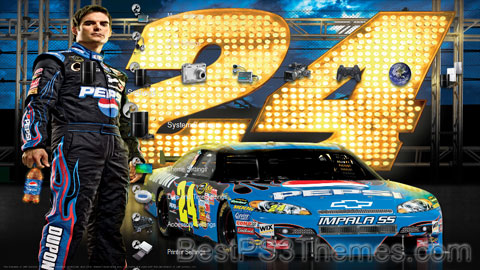Jeff Gordon theme by ryanindy124
Download: JeffGordon_2.p3t

(4 backgrounds)
| ||
|---|---|---|
|
Business and motorsport
|
||
Jeffery Michael Gordon[2] (born August 4, 1971) is an American stock car racing executive and former professional stock car racing driver who currently serves as the vice chairman of Hendrick Motorsports. He raced full-time from 1993 to 2015, driving the No. 24 Chevrolet for Hendrick Motorsports in the former NASCAR Winston Cup Series and Sprint Cup Series (now called NASCAR Cup Series), and also served as a substitute driver for Dale Earnhardt Jr. in the No. 88 Chevrolet for Hendrick Motorsports in select races during the 2016 season.[3] He is regarded as one of the best and most influential drivers in NASCAR history, helping the sport reach mainstream popularity.
Gordon started his professional racing career in the Busch Series with Hugh Connerty Racing, followed by Bill Davis Racing, winning three races, and began racing full-time in the NASCAR Winston Cup Series for Hendrick Motorsports in 1993. He is a four-time Cup Series champion, having won the title in 1995, 1997, 1998, and 2001. He also won the Daytona 500 three times in 1997, 1999, and 2005. Gordon has completed three career Grand Slams and has won a total of sixteen Crown Jewel races (three Daytona 500s, four Talladega 500s, three Coca-Cola 600s, and six Southern 500s), both of which are all-time records.
He is third on the all-time Cup wins list with 93 career wins, while having the record for the most wins in NASCAR's modern era (1972–present) and the most wins in one modern era season, with 13 during the 1998 NASCAR Winston Cup Series. Gordon's 81 pole positions led all active drivers and is third all-time, and also a modern era record; Gordon won at least one pole in 23 consecutive seasons, making this a NASCAR record. Other records include the most restrictor plate track wins with 12 and the most road course wins with 9,[4] and he was the active "iron man" leader for consecutive races participated in with 797 through the 2015 season.[5]
In 1998, NASCAR named Gordon to its 50 Greatest Drivers list. Ten years later in a 2008 article, ESPN's Terry Blount ranked him 10th in the 25 Greatest Drivers of All-Time.[6] Foxsports.com named him as the fifth best NASCAR driver of all time.[7] He was inducted into the NASCAR Hall of Fame in 2019. As of 2016, Gordon was considered the highest-paid NASCAR driver ever and the 18th highest-paid athlete of all-time with $515 million in career earnings, per Forbes.[8]
Gordon, along with Rick Hendrick, co-owns the No. 48 Chevrolet previously driven by Jimmie Johnson, who won seven Cup championships from 2006 to 2010, 2013, and in 2016. Gordon also has an equity stake in the No. 24 team.[9] Gordon also owned a Busch Series team between 1999 and 2000, Gordon/Evernham Motorsports (co-owned with Ray Evernham; later solely owned as JG Motorsports), winning twice.
Early life and career[edit]
Gordon is of Scotch-Irish descent,[10] and was born in Vallejo, California to parents Carol Ann Bickford (née Houston) and William Grinnell Gordon of Vacaville, California. Gordon's mother and biological father divorced when he was six months old.[11] His stepfather, John Bickford, married his mother in the 1970s.[12] He has a sister, Kim, who is older by four years.[13] His younger cousin, James Bickford, competed in the K&N Pro Series West.[14] Gordon attended Tri-West Hendricks High School in Lizton, Indiana and was on the school's cross country team;[15] he graduated in 1989.[16]
When he was four years old,[17] Gordon rode a BMX bike that his stepfather bought for him[16] and began racing quarter midgets at the age of five. The Roy Hayer Memorial Race Track (previously the Cracker Jack Track) in Rio Linda, California is noted as the first track Gordon ever competed on. By the age of six, Gordon had won 35 main events and set five track records.[18] In 1979 Gordon won 51 quarter midget races. When he was 11, Gordon won all 25 of the karting races he entered.[15] At age 12, Gordon became bored with cars and decided to start a career in waterskiing before switching back to driving one year later.[19] In 1986, Gordon began racing sprint cars, winning three races. The next year, Gordon was awarded a USAC license at age 16, the youngest driver to do so.[15]
During the 1980s,[15] Gordon and his family had to overcome an insurance hurdle. The minimum age for driving the sprint cars was 16, and his persistence paid off with an all Florida speed weeks. Supporting his career choice, Gordon's family moved from Vallejo to Pittsboro, Indiana, where there were more opportunities for younger racers. In the late 80's, he drove in the World of Outlaws series and picked up some feature wins. He became the youngest driver in the World of Outlaws at the time.[20] He also won races at Bloomington and Eldora Speedways.[21] After graduating from high school in 1989, he quickly changed and went to Bloomington to race that night.[22][16] Before the age of 18, Gordon had already won three short-track races and was awarded USAC Midget Car Racing Rookie of the Year in 1989. That season was highlighted by winning Night Before the 500 midget car race on the day before the Indianapolis 500.[23] During the decade, Gordon also ran sprint cars in Australia and New Zealand.[15] In 1990, Gordon won his second consecutive Night Before the 500, the Hut Hundred, and the Belleville Midget Nationals on his way to winning the USAC national Midget title.[23] In 1991, Gordon captured the USAC Silver Crown, and at the age of 20 became the youngest driver to win the season championship.[23] He also won the 4 Crown Nationals midget car race that season.[23] In his midget car career between 1989 and 1992, he finished in the Top 3 in 22 of 40 USAC midget car events.[23] In 1992, Gordon competed in the Slim Jim All Pro Series' Winchester 400, but finished 24th after crashing on lap 172.[24] The following year, he ran a Featherlite Southwest Tour race at Sears Point Raceway, finishing 29th after suffering an engine failure.[25]
In the early 1990s, Gordon expressed interest in IndyCar racing, but was not able to find a ride due to low funding.[19] However, former Formula One driver Jackie Stewart offered Gordon a test drive in Europe, in what Gordon assumed was Formula Three or Formula 3000; Gordon did not perform the test due to being in contact with NASCAR.[26]
NASCAR[edit]
Busch Series[edit]

In 1990, Gordon met Hugh Connerty, who owned some Hooters restaurants and was also a partner in Outback Steakhouse. Connerty secured some sponsorship for a car through Outback, and they tested for the last few Busch Grand National races left in 1990. Ray Evernham was called in to work with Gordon in his stock car debut. His first Busch race came on October 20, 1990 at North Carolina Motor Speedway in the AC-Delco 200. Gordon drove the No. 67 Outback Steakhouse Pontiac for Connerty. Gordon ran the second fastest lap during qualifying and started on the outside of the front row of the field. Gordon would, however, get involved in a wreck on lap 33. He ended up with a 39th-place finish.[27]
In 1991 and 1992, Gordon began racing in the Busch Series full-time, driving Ford Thunderbirds for Bill Davis Racing. In his first year as a Busch driver he won Rookie of the Year. In 1992, Gordon set a NASCAR record by capturing 11 poles in one season.[16] He was sponsored by Carolina Ford Dealers in 1991 and Baby Ruth in 1992.[28]
In 1999, Gordon along with Cup crew chief Evernham formed Gordon/Evernham Motorsports (GEM) in the Busch Series with Gordon and Rick Hendrick's son Ricky Hendrick as drivers, the Rainbow Warriors as pit crew and Patrick Donahue as crew chief.[29] The co-owned team received a full sponsorship from Pepsi and ran six races with Gordon as driver and Evernham as crew chief. GEM only survived one year as Evernham left Hendrick Motorsports, citing tension between him and the team,[30] ending one of the most dominant driver/crew-chief combinations in NASCAR history. Gordon extended his Busch experiment one more year, through 2000 as co-owner, with Rick Hendrick buying Evernham's half, and GEM becoming JG Motorsports. In two seasons, Gordon won twice, in 1999 at the Outback Steakhouse 200, the inaugural race[31] at Phoenix,[32] and 2000 at Homestead.[33]
Cup Series[edit]
Early career (1992–1994)[edit]
In 1992, Roush Racing owner Jack Roush planned to sign Gordon, but Gordon's stepfather John Bickford had insisted that Roush hire Ray Evernham; due to Roush's policy of hiring his own crew chiefs, Bickford declined.[34] Later in the year, Rick Hendrick watched Gordon race in a Busch Series event at Atlanta Motor Speedway, and Gordon joined Hendrick Motorsports two days later.[35] Gordon made his Winston Cup debut in the season-ending race, the Hooters 500 at Atlanta, finishing 31st after a crash.[36]
The following year, Gordon began competing full-time in the Winston Cup Series, driving the No. 24 car for Hendrick. He was originally supposed to race the No. 46, but complications with licensing related to Days of Thunder forced Gordon to the 24.[37] He opened the season with a win in the Gatorade Twin 125's race,[38] while also recording his first-career pole position at the fall Charlotte race,[39] and concluded 1993 with a 14th-place points finish and the Rookie of the Year Award.[16] Gordon's early success in the sport reshaped the paradigm and eventually gave younger drivers an opportunity to compete in NASCAR. However, during the season, many doubted Gordon's ability to compete at such a level at such a young age because of his tendency to push the cars too hard and crash. His last-place finish at the 1993 First Union 400 was a firm example of this theory.[40] Additionally, driver Darrell Waltrip wrote he told Hendrick during the season that Gordon had "hit everything but the pace car that year."[41]
In 1994, Gordon won the Busch Clash exhibition race at Daytona.[42] In May, Gordon won the pole for the Coca-Cola 600, and eventually the race after electing to take two tires on a green flag pit stop.[43] Three months later, he scored a hometown victory at the inaugural Brickyard 400, capitalizing on Ernie Irvan's tire going down late in the race.[44]



icons from playb3yond